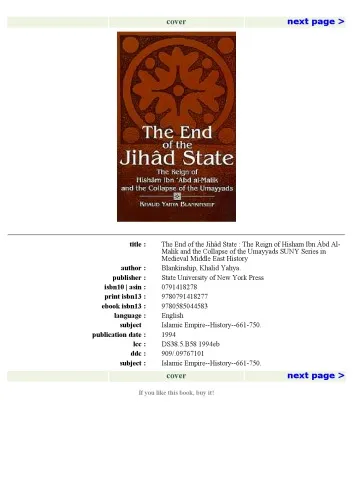The End of the Jihad State: The Reign of Hisham Ibn ’Abd al-Malik and the Collapse of the Umayyads
4.0
بر اساس نظر کاربران

شما میتونید سوالاتتون در باره کتاب رو از هوش مصنوعیش بعد از ورود بپرسید
هر دانلود یا پرسش از هوش مصنوعی 2 امتیاز لازم دارد، برای بدست آوردن امتیاز رایگان، به صفحه ی راهنمای امتیازات سر بزنید و یک سری کار ارزشمند انجام بدینکتاب های مرتبط:
مقدمهای بر کتاب "The End of the Jihad State"
کتاب "The End of the Jihad State: The Reign of Hisham Ibn ’Abd al-Malik and the Collapse of the Umayyads" اثری تاریخی و پژوهشی ارزشمند است که به بررسی دقیق دوران حکومت هشام بن عبدالملک و افول خلافت امویان میپردازد. این کتاب به قلم من، خالد وای. بلنکینشیپ، نوشته شده و با تحلیلهای نوین و پژوهشهای عمیق، ابعاد سیاسی، مذهبی و نظامی این دوره پیچیده از تاریخ اسلام را مورد واکاوی قرار میدهد.
خلاصهای از کتاب
کتاب به بررسی دوران حکومت هشام بن عبدالملک (۱۰۵-۱۲۵ هـ.ق) میپردازد؛ امیری که در یکی از بحرانیترین دورانهای خلافت اموی تلاش داشت نظم و قدرت خلافت را حفظ کند. با این حال، چالشهای متعدد از جمله جنگهای مداوم تحت پرچم Jihad، بحرانهای اقتصادی، نزاعهای مذهبی و سیاسی در داخل امپراتوری، و فشار نیروهای مخالف نظیر عباسیان و خوارج، به تدریج منجر به سقوط این خلافت شد. من این کتاب را با استفاده از منابع اولیه اسلامی و با ارزیابی تازهای از عوامل ساختاری، فرهنگی و اقتصادی آن دوره تنظیم کردهام. این اثر تلاش دارد تا نشان دهد چرا نظام Jihad State، که توسط خلفای اموی برای گسترش مرزهای اسلام پایهگذاری شده بود، به تدریج از درون دچار فروپاشی شد.
نکات کلیدی
- تحلیل عمیق ساختار حکومتی خلافت اموی و نحوه مدیریت هشام بن عبدالملک.
- بررسی علل شکست سیاستهای Jihad به عنوان وسیلهای برای تثبیت قدرت.
- مطالعه نقش اقتصاد و مالیاتها در فروپاشی خلافت.
- نقش نزاعهای مذهبی و طبقاتی در شکست امویان.
- ارتباط میان ناکامیهای نظامی و فشارهای داخلی در روند فروپاشی.
جملات معروف از کتاب
"The success of the jihad state lay in its ability to rapidly expand its borders, but its downfall lay in its inability to consolidate them."
"The reign of Hisham Ibn 'Abd al-Malik epitomized both the zenith of Umayyad expansion and the seeds of its eventual collapse."
"Economic disparity and the overemphasis on jihad as an institution were two critical factors that contributed to the undoing of the Umayyad order."
چرا این کتاب مهم است؟
کتاب "The End of the Jihad State" از این جهت اهمیت دارد که به یکی از نقاط عطف تاریخ اسلامی میپردازد و تأثیرات فراینده تبدیلی که امویان بر سیاست و جامعه اسلامی داشتند را آشکار میکند. این کتاب نه تنها برای علاقمندان به تاریخ اسلام، بلکه برای کسانی که به دنبال فهم زمینههای سیاسی و اجتماعی پیچیدهای هستند که منجر به ظهور عباسیان پس از سقوط امویان شد، منبعی ضروری و ارزشمند است. افزون بر این، تحلیلهای موجود در کتاب میتواند به مطالعه نحوه حرکت قدرت در دولتهای بزرگ و چرخههای ظهور و سقوط امپراتوریهای تاریخی کمک کند.
Introduction to "The End of the Jihad State"
"The End of the Jihad State: The Reign of Hisham Ibn ’Abd al-Malik and the Collapse of the Umayyads" provides a meticulous and thought-provoking analysis of one of the most transformative periods in Islamic history. Written by Khalid Y. Blankinship, this book delves deeply into the institutional, political, and ideological dynamics that shaped the Umayyad Caliphate, focusing particularly on the reign of Hisham Ibn 'Abd al-Malik. The work unpacks the decline of a global religious empire united under an expansive goal of jihad and explores how these factors contributed to the eventual collapse of the Umayyad dynasty.
The book underscores the inherent tensions within an empire driven by religious conquest while grappling with socioeconomic complexities and administrative inefficiencies. Through rigorous use of primary sources, including Arabic chronicles and other contemporaneous texts, Blankinship provides a balanced narrative that moves beyond conventional historiography. It situates the story of the Umayyads within a broader framework of world history, emphasizing the interplay between ideology, governance, and empire-building. This introduction outlines the book's detailed summary, key takeaways, notable quotes, and its significance.
A Detailed Summary of the Book
The book chiefly focuses on the reign of Hisham Ibn 'Abd al-Malik (r. 724–743), one of the longest-serving Umayyad caliphs. Hisham's leadership occurred during a critical juncture for the Islamic Caliphate, which was rapidly expanding territorially through campaigns of jihad but simultaneously struggling internally due to administrative challenges and growing sociopolitical discontent. Blankinship explores how the ideology of jihad served as both the driving force behind the empire's initial success and a source of its eventual undoing.
"The End of the Jihad State" argues that the Umayyad state's commitment to a militaristic ideology, centered on perpetual expansion and conquest, became unsustainable. Hisham's reign was marked by efforts to consolidate power, manage tribal rivalries, and maintain fiscal stability, but these efforts ultimately fell short in the face of mounting opposition. After Hisham's death, the Umayyads faltered under military pressures, economic strains, and uprisings, culminating in the Abbasid Revolution in 750 CE.
The book meticulously examines key events, including the wars on multiple fronts—such as the campaigns against the Byzantine Empire and the conflicts in Central Asia—and the Caliphate's inability to fully incorporate new territories economically and socially. Blankinship also sheds light on the ideological rift between the ruling elite and other Muslim groups, particularly the emerging Abbasid faction, which successfully leveraged dissatisfaction to overthrow Umayyad rule.
Key Takeaways
- The ideological foundations of the Umayyad Caliphate, particularly its commitment to jihad as a state project, ultimately undermined its longevity.
- Sociopolitical and tribal divisions within the empire weakened its cohesion and made the central authority vulnerable to external and internal challenges.
- Hisham Ibn 'Abd al-Malik's reign represents both the peak of Umayyad administrative competence and the beginning of its irreversible decline.
- The Abbasid Revolution was catalyzed in part by the Umayyad system's failure to address the economic and social grievances of its diverse population.
- The book serves as a reminder of the difficulties inherent in empire management, especially when ideological rigidity conflicts with pragmatic governance.
Famous Quotes from the Book
"The commitment to jihad, while initially uniting the Umayyad state under a single purpose, became a burden too great for the empire to bear."
"The rise and fall of the Umayyad Caliphate show the precarious balance between ideological zeal and the practical necessities of governance."
"The Abbasids exploited discontent but also represented a vision of leadership that resonated with the changing dynamics of the Muslim world."
Why This Book Matters
"The End of the Jihad State" is a significant contribution to the study of Islamic history and world empires. It bridges the gap between ideological analysis and practical governance, offering insights that are applicable to understanding both historical and contemporary state systems. By examining the Umayyad Caliphate, Blankinship sheds light on the nature of political legitimacy, state formation, and the costs of overextension.
The book's relevance extends beyond Islamic studies, as it engages with universal themes of imperial administration, ideological commitments, and the challenges of leadership in diverse and expansive territories. Scholars, historians, and policymakers alike can draw valuable lessons from the rise and fall of the Umayyads, making this book essential for anyone interested in the dynamics of empire.
دانلود رایگان مستقیم
شما میتونید سوالاتتون در باره کتاب رو از هوش مصنوعیش بعد از ورود بپرسید
دسترسی به کتابها از طریق پلتفرمهای قانونی و کتابخانههای عمومی نه تنها از حقوق نویسندگان و ناشران حمایت میکند، بلکه به پایداری فرهنگ کتابخوانی نیز کمک میرساند. پیش از دانلود، لحظهای به بررسی این گزینهها فکر کنید.
این کتاب رو در پلتفرم های دیگه ببینید
WorldCat به شما کمک میکنه تا کتاب ها رو در کتابخانه های سراسر دنیا پیدا کنید
امتیازها، نظرات تخصصی و صحبت ها درباره کتاب را در Goodreads ببینید
کتابهای کمیاب یا دست دوم را در AbeBooks پیدا کنید و بخرید
1621
بازدید4.0
امتیاز0
نظر98%
رضایتنظرات:
4.0
بر اساس 0 نظر کاربران
Questions & Answers
Ask questions about this book or help others by answering
No questions yet. Be the first to ask!















